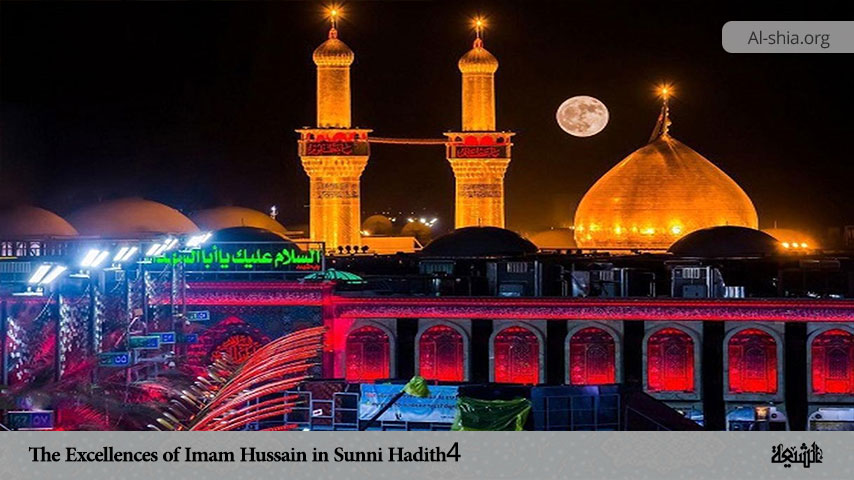In this part of the article titled “The Excellences of Imam Husain in Sunni Hadith”, we shall make reference to other Sunni hadiths on the superiority of Imam Husain (a.s).
Divine wisdom in creation can be best discerned, according to the Qur’an, in the order of nature, and in the human individual and his society. Muslim hagiography has recorded the dramatic effect the death of Husayn had on nature. Thus the famous traditionist al-Bayhaqi reported that when al-Husayn b. ‘Ali was killed, and the sun was so deeply eclipsed that stars were seen at midday. People feared that it was the Day of Resurrection (1). Nadra al-Azdiya, a woman who was contemporary with Imam Husayn, is said to have reported: ‘When al-Husayn b. ‘Ali was killed, the sky rained down blood, so that next morning we found our wells and water jugs filled with it’ (2).
The memory of the martyred Imam has been kept alive and nourished by the tears of the faithful who vicariously share in the tragedy of Imam Husayn and his loved ones and friends. Here again, tradition has extended the grief displayed by the pious for the tragedy of Karbala’ to the cosmic order. Thus al-Suyuti reports in his commentary on the verse describing God’s compassion towards the ancient martyr John son of Zachariah that ‘The heavens did not weep for the death of anyone except John son of Zachariah and al-Husayn b. ‘Ali. Its redness [at sunset] is the sign of its weeping (3).
CONCLUSION
It has already been argued that there is an existential and all-inclusive unity between the Prophet and his daughter Fatima, her husband, ‘Ali, and their two sons. This unity makes it impossible to discuss one without discussing all the others. We have, therefore, been concerned throughout this study with Imam Husain in the context of this essential unity. It must be added, however, that Imam Husain was especially close to the heart of his grandfather, the Prophet Muhammad. It is of Husayn alone that he declared: ‘Husain is of me and I am of Husain.
May God love those who love Husayn.'(4) When Surah 108 (al-Kawthar) was revealed, the Prophet announced this great favour to his close companion Anas b. Malik, on whose authority this tradition is reported. Anas asked: ‘What is al-Kawthar?’ He answered: ‘It is a river in Paradise, but neither those who violate my covenant (dhimma), nor those who shall kill the people of my House will be allowed to drink of it.'(5) Finally, Shi’i tradition has always insisted on the great merit the faithful earn in making a pilgrimage (ziyara) to the tomb of Imam Husain and the tombs of the men who were martyred with him.
Yet Sunni tradition has likewise seen great merit in this pious act (6). The ziyara to the tomb of the martyred Imam has acquired this great significance in all Muslim traditions because the Imam and his fellow martyrs are seen as models of jihad in the way of God. It is related that the father of the Imams, ‘Ali ibn Abi Talib, passed by Karbala’ after the battle of Siffin. He took a handful of its soil and exclaimed: ‘Ah, ah, on this spot some men will be slain, and will enter Paradise without reckoning!’ (7).
The spiritual unity of the Ahl al-Bayt, symbolized by the Kisa’, is in turn a symbol of the unity of all Muslims. It is for the sake of this unity in faith and commitment (Islam) to God and the truth that Imam Husain sacrificed his life. He refused a partisan Islam when he refused to legitimize Umayyad rule. Because he refused humiliation, wrongdoing and deviation from the ideals of Islamic leadership as exemplified by the Prophet and his own father ‘Ali, the Commander of the Faithful, Imam Husain drew once and for all the distinction between a true khalifa (representative) of the Apostle of God and the kings of this world. But above all, Imam Husain and his fellow martyrs accepted God’s bargain with the people of faith to exchange their lives and wealth for the eternal bliss of Paradise (8). This divine challenge is no less relevant to the Muslim community today than it was fourteen hundred years ago. It invites us still to ‘a garden whose breadth is greater than the heavens and earth, prepared for those who fear God’.
NOTES:
__________________________________________________
1. Abu Bakr Ahmad b Husayn b. al-Bayhaqi, Al-Sunan al-Kubra (Haydarabad, 1344), III, 337.
2. Ibn Hajar, p. 291.
3. See the commentary of 19:13 in al-Suyuti
4. Al-Tirmidhi, 2: 306.
5. See the commentary on sura 108 in al-Suyuti.
6. Muhibb al-Din Ahmad b. Abd Allah al-Tabari, Dhakha’ir al- ‘uqba (n.p., 1356), p. 151. Note also the popularity of the Mosque of the Head of Imam Husain in Cairo as a place of pilgrimage
7. Shihab al-Din Ahmad b. Hajar al-Haytami al-Asqalani, Tahdhib al-tahdhib (Haydarabad [Deccan], 1325), 2: 348.
8. See Qur’an 9:111.


















